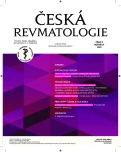-
Medical journals
- Career
Health Related quality of life in patients with rheumatoid arthritis during the first year of treatment by TNF inhibitors (assessed by SF-36 questionnaire and compared with a sample of general Czech population) – results from the Czech biologics registry ATTRA
Authors: J. Závada 1; M. Uher 2; K. Hejduk 2; J. Vencovský 3,1; K. Pavelka 1,3; Kolektiv Lékařů Biologických Center
Authors‘ workplace: Revmatologický ústav, Praha 1; Institut biostatistiky a analýz, Masarykova univerzita, Brno 2; Česká revmatologická společnost JEP 3
Published in: Čes. Revmatol., 21, 2013, No. 3, p. 123-130.
Category: Original Papers
Overview
Introduction:
Health-related quality of life (HRQOL) is an important indicator of severity of musculoskeletal conditions. SF-36 is a generic patient-reported measure of HRQOL implemented in the follow-up protocol of the ATTRA registry. Our goal was to assess HRQOL (as measured by SF-36 and its individual domains) before and after first-line treatment with TNF inhibitors (Etanercept, Adalimumab, Infliximab) in patients with rheumatoid arthritis, and to compare the results with age-adjusted normative values of general Czech population.Patients and methods:
823 RA patients with available clinical data (DAS28, HAQ), and HRQOL data (SF-36) completing one year tratment were included in the analysis.Results:
In the analyzed sample there were 82 % females and 18 % males with median age of 51 years (IQR 41-58) and median disease duration of 7 years (IQR 3-13) at the beginning of anti-TNF therapy. 28 % were treated by infliximab, 46 % by adalimumab, and 26 % by etanercept. Clinically meaningful and statistically significant improvements were observed in all dimensions of HRQOL assessed by SF-36, and in the mental health domain the RA patients reached similar scores as individuals from the age-standardized sample of general Czech population.Conclusions:
RA had a severe impact on all dimensions of HRQOL. During one year of treatment, TNF-inhibitors substantially improved HRQOL, though not to the normal level.Key words:
Health-related quality of life, SF-36, biologic disease-modifying anti-rheumatic drugs, anti-tumour necrosis factor drugs, rheumatoid arthritis, registry
Sources
1. Drossaers-Bakker KW, de Buck M, van Zeben D, Zwinderman AH, Breedveld FC, Hazes JM. Long-term course and outcome of functional capacity in rheumatoid arthritis: the effect of disease activity and radiologic damage over time. Arthritis Rheum 1999;42 : 1854-60.
2. SokkaT, Kautiainen H, Hannonen P, Pincus T. Changes in Health Assessment Questionnaire disability scores over five years in patients with rheumatoid arthritis compared with the general population. Arthritis Rheum 2006;54 : 3113-8.
3: Bellamy N, Boers M, Felson D, Fries J, Furst D, Henry D, Liang M, Lovell D, March L, Strand V, et al. Health status instruments / utilities. J Rheumatol 1995;22 : 1203-7.
4. Ware JE Jr, Sherbourne CD. The MOS 36-item short-form health survey (SF-36). I. Conceptual framework and item selection. Med Care 1992; 30 : 473-83.
5. McHorney CA, Ware JE Jr, Raczek AE. The MOS 36-Item Short-Form Health Survey (SF-36): II. Psychometric and clinical tests of validity in measuring physical and mental health constructs. Med Care 1993; 31 : 247-63.
6. Jaeschke R, Singer J, Guyatt GH. Measurement of health status. Ascertaining the minimal clinically important difference. Control Clin Trials 1989;10 : 407-15.
7. Kosinski M, Zhao SZ, Dedhiya S, et al. Determining minimally important changes in generic and disease specific health-related quality of life questionnaires in clinical trials of rheumatoid arthritis. Arthritis Rheum 2000; 43 : 1478-87.
8. Strand V, Singh JA. Newer biological agents in rheumatoid arthritis: impact on health-related quality of life and productivity. Drugs 2010;70 : 121-45.
9. Sobotík Z. Zkušenosti s použitím předběžné české verze amerického dotazníku o zdraví (SF36). Zdravotnictví v ČR 1998;1-2 : 50-54.
10. Cohen J. Statistical Power Analysis for the Behavioural Sciences. 2nd ed. Mahwah NJ. Lawrence Erlbaum; 1988.
Labels
Dermatology & STDs Paediatric rheumatology Rheumatology
Article was published inCzech Rheumatology

2013 Issue 3-
All articles in this issue
- Recommendations of the Czech Society for Rheumatology for the treatment of patients with SLE
- Health Related quality of life in patients with rheumatoid arthritis during the first year of treatment by TNF inhibitors (assessed by SF-36 questionnaire and compared with a sample of general Czech population) – results from the Czech biologics registry ATTRA
- What are the predictive factors of response to treatment with tocilizumab in routine clinical practice? The experience of the Czech national registry ATTRA
- Myocophenolate mofetil in the treatment of systemic lupus erythematosus
- Czech Rheumatology
- Journal archive
- Current issue
- Online only
- About the journal
Most read in this issue- Recommendations of the Czech Society for Rheumatology for the treatment of patients with SLE
- Myocophenolate mofetil in the treatment of systemic lupus erythematosus
- Health Related quality of life in patients with rheumatoid arthritis during the first year of treatment by TNF inhibitors (assessed by SF-36 questionnaire and compared with a sample of general Czech population) – results from the Czech biologics registry ATTRA
- What are the predictive factors of response to treatment with tocilizumab in routine clinical practice? The experience of the Czech national registry ATTRA
Login#ADS_BOTTOM_SCRIPTS#Forgotten passwordEnter the email address that you registered with. We will send you instructions on how to set a new password.
- Career

